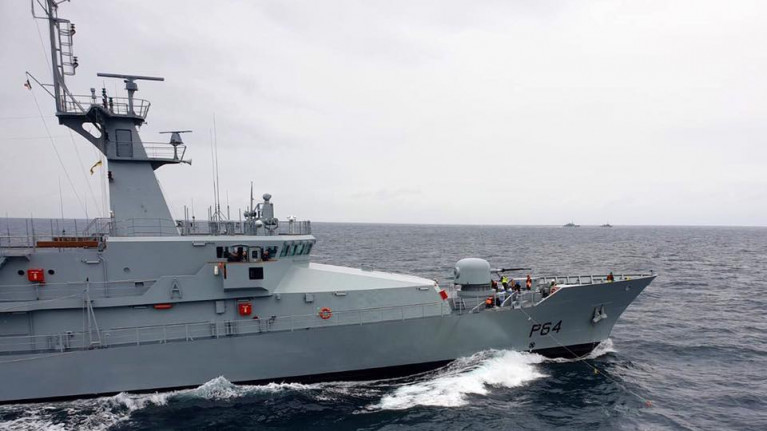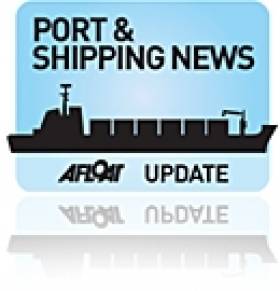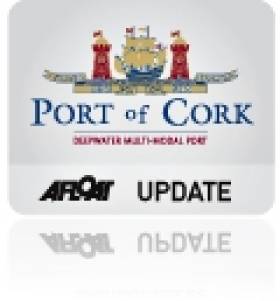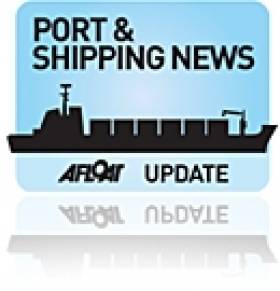Displaying items by tag: Irish Maritime Forum
Expert Group Tells Government to Bolster Naval Service to Protect Irish Maritime Security
A submission from an expert group to the government says it must bolster the Naval Service to protect the country's maritime security.
The submission, seen by the Irish Examiner, was made by the Irish Maritime Forum, an independent and non-political collegiate of professionals who have a wide range of experience across the maritime domain.
It was sent to the government as part of the public consultation on a new National Security Strategy which will lead how the State protects its national security and vital interests from current and emerging threats over the period 2020-2025.
The maritime forum members said the balance between the elements of the Defence Forces should reflect the fact that we are an island nation, with a sea area of control eight times our landmass.
To this end, the forum says the Naval Service should be upgraded to reflect international norms and its strengths and capabilities be enhanced.
More on this story by clicking here.
Annual Forum Reflects on Irish Maritime Industry
#IrishMaritimeForum - The Irish Maritime Forum held last Friday was the place to be as more than 150 attendees where at the annual event at the National Maritime College of Ireland (NMCI) in Ringaskiddy.
The forum which was both hosted and organised by the NMCI looked at “Success through Synergy – an innovative and dynamic approach to the future”. The event had welcomed both organisations and maritime professionals operating in the broad Maritime Industry in Ireland.
The event was officially opened by John Mullins (Chairman, Port of Cork) before Simon Coveney, Minister of State for Agriculture, Food and the Marine, and Defence took to the stage to discuss the importance of the Maritime Industry to Ireland’s economic recovery and how "solutions to a number of the World's great challenges will come from the sea".
Having recently attended the Ploughing the Minister mentioned “how SeaFest (Maritime Festival) will become to maritime what the Ploughing Championships are to agriculture".
Setting the scene for the speakers Fergal O’Brien (IBEC) spoke about the Irish Economy and how we have gone from boom, to bust to recovery.
Liam Lacey, Director of the IMDO, took to the stage to discuss Ireland’s maritime potential, trends in the international shipping industry, and the Irish Tonnage tax system.
Jonathan Healy, MC for the event, then interviewed five key industry leaders in a Maritime Skills Panel Discussion; Rory McGuire (Flagship Management), Conor Mowlds (Head of College), Kevin Richardson (President of the International Harbour Masters Association), Captain Dave Elliott (Arklow Shipping) and Cormac Gebreurs (Head of Halpin Centre for Research & innovation).
The Maritime Skills panel discussed the shortage of skilled personnel in the industry, what issues face the industry in terms of finding the right personnel, and how new legislation is affecting the industry in terms of recruitment.
Dave Ward, Commercial Service Manager with Commissioner of Irish Lights, who spoke about the Great Lighthouses of Ireland.
Dave spoke about the role CIL are taking in the development of all island Lighthouse Tourism Project which looks at Securing and Protecting Lighthouse Heritage while stimulating local economic development and employment in coastal communities.
First Irish Maritime Forum Deemed a Success
#IrishMaritimeForum – The inaugural Irish Maritime Forum recently held in Cork was attended by more than 150 delegates representing the shipping industry, various stakeholders and departments and the Irish government agency, the Irish Maritime Development Office (IMDO).
According to the IMDO, they were delighted to join an exciting line up of speakers for the event's main seminar entitled 'Developing the Dynamic Future of Ireland's Maritime Sector' which was hosted by the Port of Cork in partnership with the Irish Ports Association.
Combined they gathered industry leaders from across the Irish maritime sector to the conference that was opened by Minister Sean Sherlock TD, who spoke of the importance of ports as strategic points for trade growth, both nationally and internationally. The minister also drew attention to the recent uplift in port volumes as indicated by the IMDO's iship index.
A cross section of the Maritime world was in evidence with port operators, department representatives, pilots, stevedores, European officials, educators, mariners and many more all contributing to meaningful debate during the conference and well into the break out times.
Speaking at the event, the IMDO's Business Development Manager Rebecca Wardell, emphasised the necessity for ports to look at potential areas of innovation, efficiency in work practices, competition across services and planning the means to meet future capacity demands over a 20 year plus horizon.
She also stressed the IMDO's commitment to be involved in an on-going collaborative process to assist ports in this regard.
The importance of a forum such as this cannot be underestimated, creating a unique opportunity for those in the industry to come together and develop ideas for the future of the sector. This is particularly relevant at present with significant government support for the development of the sector evidenced by the cross departmental strategy, Harvesting Our Ocean's Wealth.
On a related note, another major conference Our Ocean Wealth was held last June in Dublin, for more details about the work of 'harvesting' our national resources, visit: www.ouroceanwealth.ie
Following the conclusion of the Irish Maritime Forum, a Gala Dinner that evening was hosted by the Irish Institute of Master Mariners, for further details about the IMM: www.mastermariners.com
For further information on the role of the IMDO including the iShip Index and much visit: www.imdo.ie
Liebherr Announced as Sponsor of Irish Maritime Forum 2014
#maritimeforum – The Liebherr Maritime Crane Division was today announced as sponsor of the first ever Irish Maritime Forum which will take place in Cork's City Hall on Friday 26th September 2014. The forum themed 'Developing the Dynamic Future for Ireland's Maritime Sector' will focus on exploring the future of the maritime sector within Ireland and will look closely at the challenges and opportunities faced by many within the industry.
Delegates from across the Irish maritime sector are expected to attend the forum which is being hosted by the Port of Cork in conjunction with the Irish Ports Association.
Commenting on the partnership with Liebherr, Mr John Mullins, Chairman of the Port of Cork, said "I am delighted to welcome Liebherr on board as key sponsor for the forum, which is already generating significant interest from key players across the maritime sector. As a leading manufacturer of industrial machinery including maritime cranes, Liebherr plays an important role in the commercial shipping business both in Ireland and further afield."
Brendan Keating, Chief Executive of the Port of Cork Company, added "The Port of Cork is honoured to be hosting this forum in Cork's City Hall and we hope that delegates will benefit from attending the forum and also enjoy Cork City and its many attractions".
Mr Pat O'Leary Managing Director of the Liebherr Maritime Division, with production plants in Killarney, Nenzing, Rostock and Sunderland, commented that " The Port of Cork has been a partner of Liebherr for almost 50 years. Liebherr is delighted that this Forum is being held in Cork and is proud to be associated with this important event for the Maritime sector in Ireland."
Speakers confirmed for the forum include Mr Vincent De Saedeleer, Vice President of Port of Zebrugee; Mr Alan Gray, Managing Director of the Indecon International Consulting Group; Mr Liam Lacey, Director of IMDO; Captain Fredrik Van Wijnen, General Secretary of the Confederation of European Shipmasters' Associations (CESMA), Isabelle Ryckbost, Secretary General of the European Sea Ports Organisation and Christophe Mathieu, Deputy Managing Director of Brittany Ferries.
Irish Institute of Master Mariners to Host Gala Dinner at Inaugural Irish Maritime Forum
#ForumGalaDinner - The Irish Institute of Master Mariners (IIMM) has posted details on their website of their members Annual Marine Ball which will be replaced this year instead by a Gala Dinner to be held at Cork City Hall on Friday 26th September.
The change of the annual event is to facilitate the Gala Dinner in conjunction with the previously reported inaugural Irish Maritime Forum held on the same day in Cork City Hall in which the IIMM is supporting.
Members tickets for the Gala Dinner cost €65 per person and can be purchased by registering online through the IIMM's website HERE and by ticking the box for Gala Dinner. Accommodation can also be booked through the website at registration and for accommodation there is a choice of the Clarion or Gresham Metropole Hotels.
The theme of the forum hosted by the Port of Cork Company is 'Developing the Dynamic Future for Ireland's Maritime Sector' which is to focus on exploring the future of the maritime sector within Ireland. Also to be examined more closely are the challenges and opportunities faced by many within the sector.
In addition to a welcoming address by an Irish Government Minister, there will be lunch and a partner's programme organised. Delegates interested in attending the Irish Maritime Forum 2014 (and exhibition) are asked to register by visiting: www.irishmaritimeforum.ie
































































